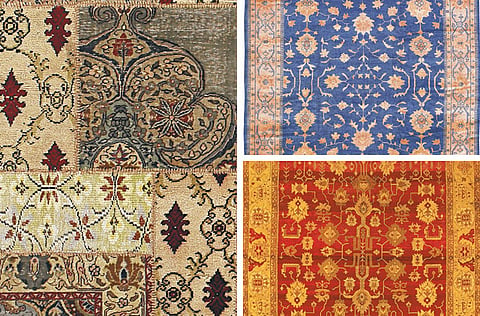Carpets weave their magic
These handcrafted beauties are traditional symbols of art and culture

This week, inspired by Ramadan, we focus on something that is intrinsically symbolic and sacred in both Islamic faith and Islamic art and culture: the carpet.
The traditional prayer rug is a fundamental part of the Islamic heritage which, in essence, constitutes a Muslim's place of daily worship — it is his private mosque symbolic of a historically nomadic culture. A Muslim may transport his prayer rug to any place in the world; wherever he lays his prayer rug is his place of worship. Traditionally, the prayer rug carries an illustration of the Garden of Paradise and the Tree of Life within it. This may be depicted in an ornate and floral design or it may take on a geometrical style but in either case the symbolism is the same, providing a spiritual oasis in the midst of the deserts of the world. The design should be calming and not distract from the act of worship.
Like the prayer rug, handcrafted carpets are part of the Islamic cultural heritage, showcasing handcraftsmanship which gives them longevity and variations in their weave, making them unique pieces. The UAE is the perfect hunting ground for anyone looking to invest in a traditional carpet, many made in Iran. Carpets lend themselves to a variety of uses in an interiors scheme — from decorative wall hangings and adding a warm touch for bare feet on an otherwise stone-cold floor to creating visual boundaries for different uses of space — such as a large carpet encompassing the dining area and visually separating it from the sitting room without the need for physical partitions.
***********
Yamamak Pale is handmade. Master craftsmen have created a patchwork from vintage rugs chosen for their quality, colour and design. Each piece is unique and gives a contemporary twist to the traditional rug. Each Yamamak is a one of a kind, so precise colouring may vary. Available in various sizes. The Rug Company, price available upon request.
Amritsar 405 by The Rug Company is handmade. The pile is hand-knotted from wool and carefully distressed to give it the appearance of an antique rug. The design is taken from an antique original, subtly updated for today's interiors. Available made to order only, price available upon request.
This pure silk Kashmiri jewelled kani carpet is hand-knotted with silk and zari thread, and semi-precious stones are embedded in the carpet. Dimensions: 4x6 feet. Kani Home, Dh5,500.
Kani Home, Ibn Battuta Mall, Dubai, has a range of carpets to suit all needs. The carpets are handmade by artisans of a Kashmiri village who follow an ancient art called kani — the art of weaving exotic patterns into carpets and shawls using grass needles.
This Qom hand-knotted carpet has 1,000 knots per square inch. It's made of 100 per cent silk and it takes three years for one person to weave. Dimensions: 9x6 feet. Kani Home, Dh48,600.
This design is called Kashan and it's a hand-knotted carpet made of 100 per cent pure silk with 1,000 knots per square inch. It takes eight months for one person to weave this carpet. Dimension: 2x3 feet. Price: Dh4,600.
Ushak 505 by The Rug Company is hand-knotted using yarn that is hand-spun from wool and mohair, which gives it an exceptionally soft pile. The design is taken from an antique rug that has been updated with contemporary colours by the designers. Available made to order only, price available upon request.
Akdamar Green is hand-knotted using yarn that is hand-spun from wool and mohair. The design is taken from an antique rug that has been updated by the designers with contemporary colours. Available in various sizes. The Rug Company, price available upon request.
— Beatrice Boardman is a UAE-based fashion and interiors consultant
Sign up for the Daily Briefing
Get the latest news and updates straight to your inbox

